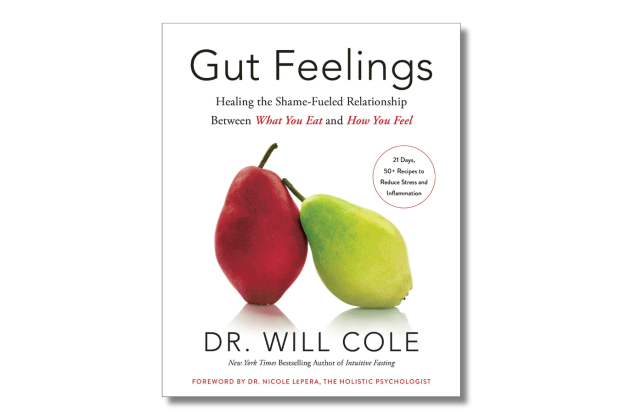*Affiliate disclosure.
We all know that diet culture is bad, but if you feel shamed into eating clean, that might be just as bad for your gut health. The mind-gut connection is the subject of Gut Feelings: Healing the Shame-Fueled Relationship Between What You Eat and How You Feel, Dr. Will Cole’s latest book. The goop-approved functional medicine expert has dedicated his career to guiding people away from the latest wellness fads and trends in favor of a more intuitive approach to wellness.
“I’ve got butterflies in my stomach just thinking about it!” “Oh, I’m far too nervous to eat.” Metaphors and sayings linking the brain and the belly can be found anywhere – and this connection is far from abstract.
There’s a true neural pathway connecting mind and gut, a link that means that the food we eat directly contributes to our moods and mental health – and that our emotions can improve (or impede!) our digestion and overall wellbeing. A healthy relationship to food leads to a healthier overall body; feelings of shame and guilt, meanwhile, can be our wellness downfall.
Want more top picks? Sign up for the newsletter for more well-researched smart wellness advice, interviews, guides and more.
Both Diet Culture and Hustle Culture Can Be Harmful
Dr. Cole’s latest work delves deep into the scientific research showing how shame, trauma, and stress can have negative ramifications on our health, exploring how ever-changing wellness fads and trends has led to rampant “shameflammation” — and thus increased incidence of chronic health conditions such as autoimmune disorders, depression, IBS, and more.
The neologism, he says, “like pretty much everything in my book, it’s born out of my work with telehealth patients.”
“So much of your job as a practitioner and as a doctor is as an educator, and I think that’s where the concept of ‘shameflammation’ came from,” he says, noting that for him, the word encompasses the links between chronic stress, unresolved trauma, and our own biochemistry.
“I often see people that eat clean foods, foods that ‘love them back,’” he says, “but they’re serving their bodies a big slice of shame every day that’s raising their inflammation levels and it’s dysregulating their system, and it’s impacting their neuro-endocrine access.” Eating clean out of a sense of guilt or shame, he adds, can get us stuck in fight-or-flight mode, which begets a state of chronic inflammation and a host of related immune and hormone issues.
“When you look at the statistics of what is hurting us – Westerners as a whole, but certainly America is at the top of the list when it comes to chronic health problems — stress is implicated in just about all of them,” says Cole.
Of course, shameflammation isn’t just linked to diet. One pervasive issue, particularly in the West, is toxic productivity, a go-getter mindset that, he says, is “an insidious source of many people’s health woes.”
“You really can’t talk about stress without talking about what they call ‘toxic productivity,’ this sort of, go-go-go, hustle culture, burnout is seen as a badge of honor,” says Cole. “But the reality is that it’s impacting cardio-metabolic issues, heart attack, and stroke. It’s triggering auto-immune conditions in some people, to have genetic variants for all these things. It’s impacting our mental health, our brain health, it’s impacting many things, it’s impacting things like cancer and its connection to stress, and to metabolic issues, insulin resistance, diabetes.”
Shame Has No Place in Our Diets — How to Cultivate Intuition Instead

Of course, understanding this theoretically and managing it day-to-day are two different missions.
“We need to have more conversations about what that actually looks like, and give people practical tools,” he says. “That’s part of why I wrote Gut Feelings: to kind of recalibrate our relationship with ourselves and our lives and the choices we make, to reconnect to our gut feelings, and to live in a more sane way – a less frenetic way.”
The book is structured around a 21-day explorative wellness journey and features fifty nutrient-dense recipes, each of which features those foods that “love us back.” With this format, he marries both a cultivation of intuition and a more prescriptivist mindset. But walking that line, he says, is a study in balance that isn’t always easy to communicate or to comprehend.
“On one side, you see what we would call toxic diet culture,” he says, evoking traditional models of reducing caloric intake and increasing exercise with a goal of losing weight.
“It’s all about thinness and vanity,” he says of this approach.
“And then on the other side, it’s that anti-diet-culture,” he says, “which I would say can be equally as toxic as the toxic diet culture.”
While he has no qualms with the body positivity movement in theory, in practice, he takes issue with some of the tenets of this now-widespread philosophy.
“There are some foods that don’t love humans back,” he says. “It’s OK to call a spade a spade, and say that these things aren’t serving us.”
Such foods are nothing surprising: refined sugar, alcohol, and highly processed foods. But in a wellness world governed by an “everything in moderation” mentality, highlighting foods that are doing us no favors is somewhat refreshing.
“If we’re really operating from a space of self-love and self-respect, we really need to talk about what’s plaguing us in the Western world,” he says. “It’s cardio-metabolic problems; it’s auto-immune issues; it’s brain health issues. A big component to them are the foods that people are eating, and I think it’s OK to have these hard conversations without it being automatically labeled as toxic diet culture. Avoiding things that don’t love you back isn’t restrictive; it’s self-respect.”
21 Days From the Toxic Diet + Hustle Culture and Into Sustainable Wellness

In addition to this more prescriptivist approach, however, Cole’s book relies heavily on people’s abilities – and willingness – to get in touch with their own feelings and intuition. And this may be an even more difficult barrier to cross.
“You can’t just say, ‘Don’t stress,’ or ‘Don’t have stress in your life,’ because then they’ll stress about not stressing,” he says. “And stressing about eating healthy and eating good for your health, or doing anything, it could be movement, it could be meditation. Stressing and shaming and obsessing and making it orthorexic [an unhealthy focus on eating in a healthy way] when it comes to food is just the antithesis to sustainable wellness.”
Which is why the book includes myriad tools and exercises to help people practice tapping into their intuition. Each day of the plan features “micro-moments” that lead people to check in with their bodies and emotions: On Day 3, readers are invited to use meditation to fight sugar cravings; Day 7 offers new breathing exercises; Day 12 invites participants to mindfully set down your phone.
“They’re nothing big, there’s nothing super arduous for people to lean into,” he says. “But it is a mini-reckoning every day of checking yourself, and checking your feelings, where if you can have this mindfulness moment and bring something that anchors you in the present moment and regulates your nervous system and creates a mindful awareness.”
And it’s the cultivation of this awareness that is so essential for the sustainability of the protocol — not just for the 21 days outlined in the book, but indeed for the rest of our lives.
“We all are evolving and dynamically changing over time on a physiological level and also on a mental, emotional, and spiritual level,” he says. “So I think that inherently within the protocol itself of the book, it is built to create a mindful awareness, so you can do the thing out of self-respect and self-love and nourishment, and not out of restriction.”
Read More on Organic Authority

From Skin to Sex Drive, Doctor Explains 6 Hormones That Affect Whole Health
13 Adaptogens to Help You Conquer Stress
When To Take Your Adaptogens For the Best Results
Note! The opinions and views expressed by the authors at Organic Authority in blogs and on social media and more, are theirs alone and do not necessarily reflect the views, opinions or position of Organic Authority, Inc and do not necessarily represent the views of Organic Authority sponsors and/or partners. Organic Authority content is for informational and entertainment purposes, and any views expressed should not be accepted as a substitute for qualified expertise. Any highlighted alternative studies are intended to spark conversation and are for information purposes only. We are not here to diagnose or treat any health or medical conditions, nor should this be relied upon as a substitute for professional medical advice, diagnosis or treatment, even if it features the advice of medical practitioners and physicians. When making any lifestyle or health changes, consult your primary care physician.
*Note! This article contains affiliate links that are independently sourced and vetted by our editorial team, which we may earn a commission on. This helps us reduce the number of ads we serve on Organic Authority and help deliver you a better user experience. We are here to help you navigate the overwhelming world of consumer products to source and uncover thoughtfully made, conscious clean products.
Source link

